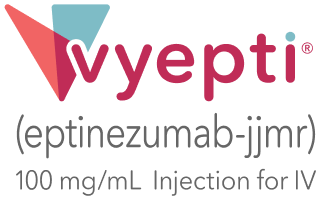VYEPTI consistently demonstrated as well tolerated in clinical trials
PIVOTAL TRIALS Read full PROMISE-1 clinical publication ![]() Read full PROMISE-2 clinical publication
Read full PROMISE-2 clinical publication![]()
Adverse reactions occurring in PROMISE-1 and PROMISE-2 pivotal phase 3 trials of over 1,700 patients1
Most common adverse reactions (incidence of ≥2% for VYEPTI and ≥2% greater than placebo)1
VYEPTI 100 mg (n=579) |
VYEPTI 300 mg (n=574) |
Placebo (n=588) |
||||
| Nasophar-yngitis | 6% | 8% | 6% | |||
| Hypersen-sitivity reactions* | 1% | 2% | 0% |
*Hypersensitivity reactions included multiple related adverse event (AE) terms, such as hypersensitivity, pruritus, and flushing/hot flush, that occurred on the day of dosing.
PREVAIL Read full clinical publication![]()
Adverse reactions occurring in the PREVAIL 2-year, open-label, phase 3 trial2
Most common study drug-related treatment-emergent adverse events (TEAEs)2
VYEPTI 300 mg (n=128) |
||
| Hypersensitivity reaction | 4% | |
| Fatigue | 3% |
There were 21 study drug-related TEAEs; the most common were hypersensitivity and fatigue.
- All other study drug-related TEAEs were less that 1%, including anaphylaxis, back pain, blood pressure systolic increased, constipation, etc
- The full alphabetical listing is available within the full 2-year study publication
6.3% of participants discontinued treatment due to TEAE.
14% of patients reported at least 1 study drug-related TEAE.2
Immunogenicity: In an open-label study with 84 weeks of treatment, 18% (23/128) of patients developed anti-eptinezumab-jjmr antibodies, and 39% (9/23) of those patients developed anti-eptinezumab-jjmr neutralizing antibodies. Formation of antibodies did not affect efficacy or the safety profile of eptinezumab.2







